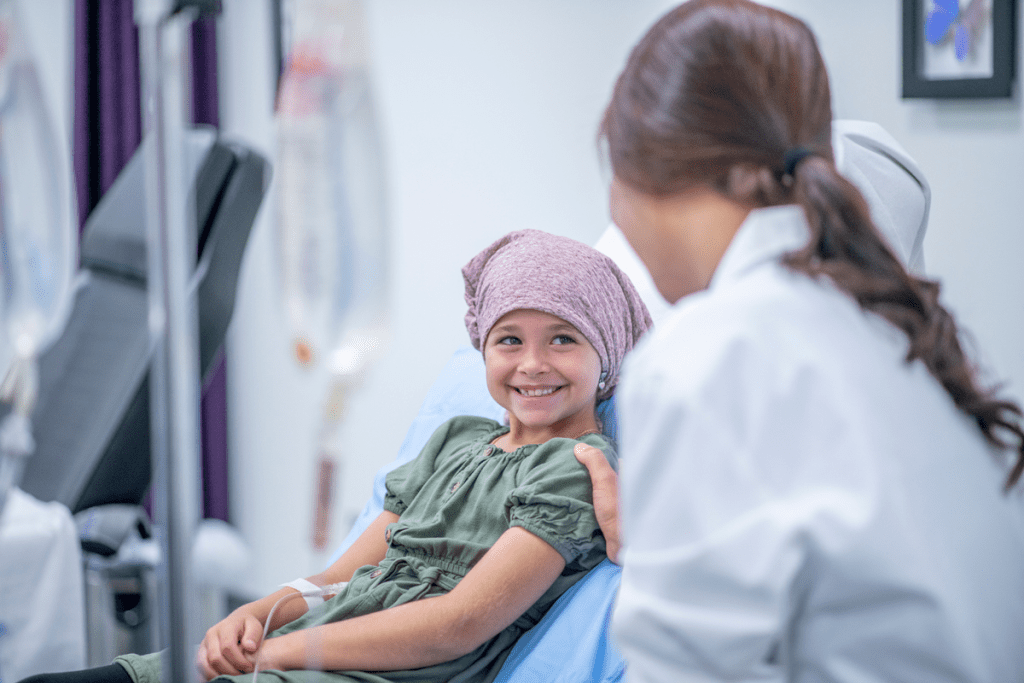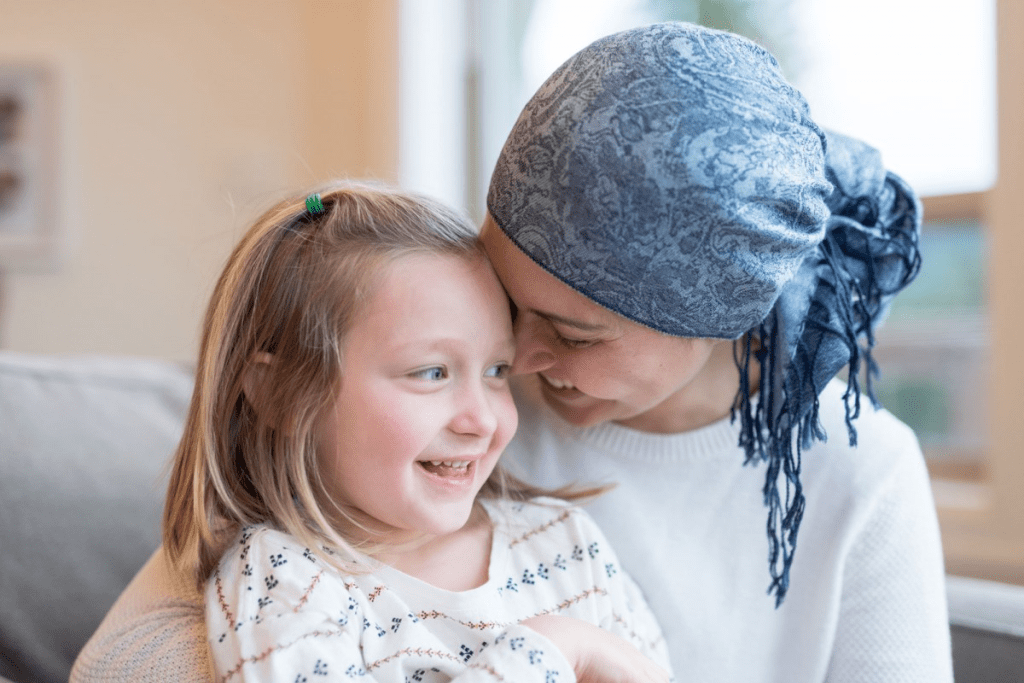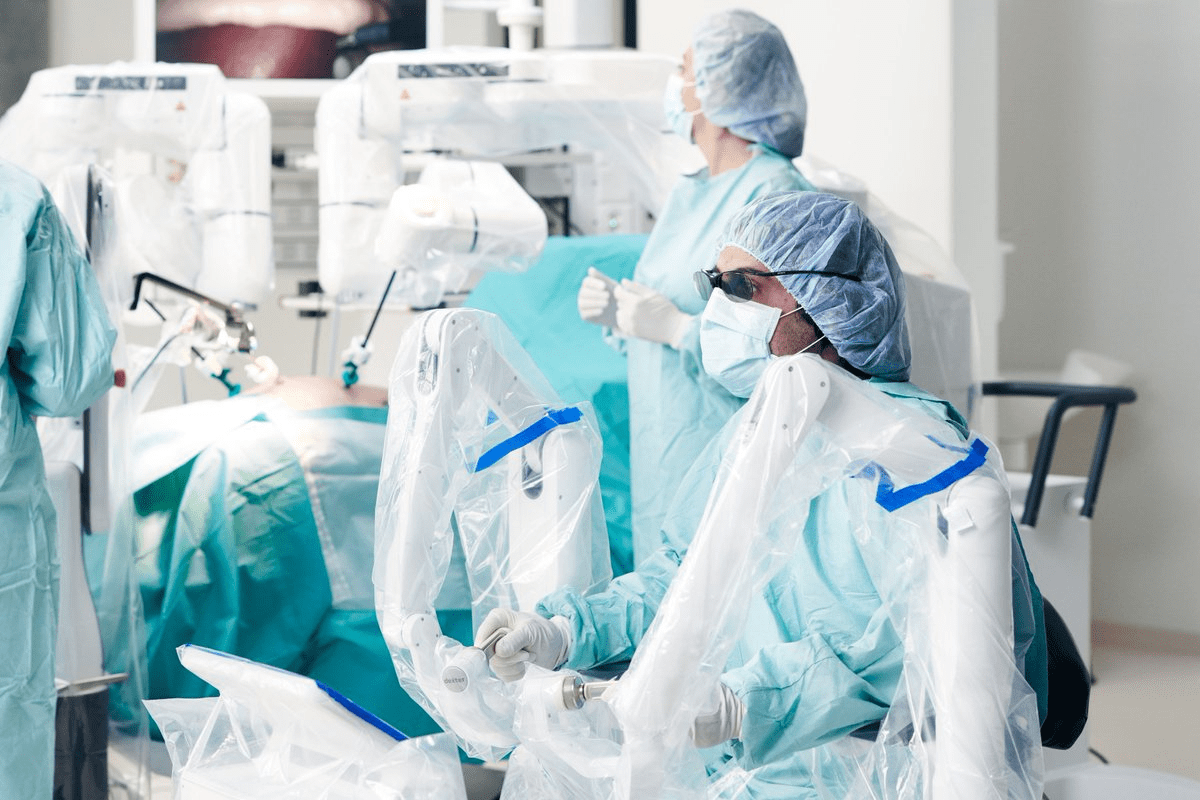When you hear that your child has cancer, it changes everything. The road ahead is tough, with emotional, medical, and social hurdles. At LivHospital, we know how vital support is during these hard times, including sensitive conversations like explaining to others about a 5 year old with cancer what to tell classmates.

Every year, about 9,550 kids under 15 in the U.S. get cancer. We’re dedicated to top-notch healthcare and support for families facing pediatric cancer.
Our mission is to deliver complete care tailored to each family’s needs. We offer guidance and support to positively impact those touched by childhood cancer.
Key Takeaways
- Understanding the diagnosis and treatment options for pediatric cancer.
- Accessing emotional support for families dealing with childhood cancer.
- Navigating the medical and social challenges associated with pediatric cancer.
- The importance of complete care in treating childhood cancer.
- LivHospital’s commitment to providing world-class healthcare for international patients.
Understanding Childhood Cancer: Facts and Statistics
It’s important to know the facts and stats about childhood cancer. This knowledge helps support families and improve treatment results. Childhood cancer is rare but affects many families worldwide. Every year, over 300,000 kids are diagnosed with cancer, making it a top cause of death in children.

Common Types of Childhood Cancer
Childhood cancer includes many types, with some being more common. The most common types are:
- Leukemia: Cancer of the blood and bone marrow, making up about 30% of childhood cancers.
- Brain and Central Nervous System Tumors: Tumours in the brain and spinal cord account for about 25% of cases.
- Neuroblastoma: Cancer in certain nerve cells, often in the adrenal gland, neck, chest, or spinal cord.
- Wilms Tumour: A kidney cancer that usually affects kids around 3 to 4 years old.
Current Survival Rates and Treatment Advances
There’s been a lot of progress in treating childhood cancer. About 80% of children now survive at least five years after diagnosis, up from less than 60% in 1970. New medical technology, better chemotherapy, and surgery have helped. Specialized pediatric cancer centers are key in providing the best care and improving survival rates.
Long-term Effects and Survivorship Challenges
Survivors of childhood cancer may face long-term challenges. These can include heart problems, secondary cancers, and issues in school and social life. Survivors need to get ongoing care from a team of experts.
Parents and caregivers need support from their child’s cancer care team. This team includes social workers, counsellors, nurses, psychologists, and doctors. Their help is essential in dealing with the complexities of childhood cancer treatment and ensuring the best outcomes for their children.
First Steps After a Child’s Cancer Diagnosis
When a family finds out their child has cancer, they must quickly find the right care. This journey includes several key steps. These steps can greatly affect the treatment and the family’s experience.
Finding Specialized Pediatric Cancer Centers
Families need to find centers with the latest treatments and expert teams. LivHospital is an example of a place that offers top care. Specialized pediatric cancer centers have the newest technology and experienced staff.

When choosing a center, families should look at several things. They should check the center’s experience with the child’s cancer type. They should also see if there are clinical trials and what support services are available.
Assembling a Medical Team and Support Network
It’s important to know the people on your child’s care team. Asking for a nurse navigator or social worker can help. These people can guide you, answer questions, and offer emotional support.
Having a support network is also key. This network includes family, friends, and other parents who have been through this. They can offer practical help, emotional support, and valuable advice.
Organizing Medical Information and Treatment Plans
Keeping a notebook or digital file for notes and questions is helpful. It’s important to understand the treatment plan. This includes the types of treatments, possible side effects, and follow-up care.
- Understanding the diagnosis and treatment options
- Keeping track of appointments and medications
- Organizing test results and medical records
By following these steps, families can better handle their child’s cancer diagnosis. They can ensure their child gets the best care possible.
Words of Encouragement for Parents of a Child with Cancer
When a child gets cancer, it changes everything for parents. It’s a huge challenge that brings a lot of emotional pain. Families need more than just medical help; they need emotional support, too.
Acknowledging Grief While Offering Hope
Parents feel a deep sadness when their child gets cancer. Saying “I’m so sorry your child is going through this” helps a lot. It shows you understand their pain and are there to support them.
At the same time, it’s important to offer hope. You can say you believe in the treatment or share stories of kids who beat cancer. This gives parents something to hold onto.
Using positive and uplifting language is key. Saying “Your child is strong and capable” or “You’re doing a great job” can really help. It keeps parents hopeful.
Helpful Phrases and Comments to Avoid
Knowing what to say and what not to say is important when supporting parents. Some comments, even if meant well, can hurt. Saying “Stay positive” or “It’s going to be okay” can make things worse. Instead, just be there and listen.
- Comments to avoid: “You’re lucky it’s not worse” or “At least it’s not terminal.”
- Helpful phrases: “I’m here for you,” “How can I support you today?” or “Your feelings are valid.”
Supporting Parents Through Treatment Milestones
Celebrating treatment milestones is a big part of supporting parents. Whether it’s finishing chemotherapy or reaching a treatment milestone, these moments are important. They show progress and give hope.
Here are some ways to support parents at these times:
- Sending a congratulatory message or card.
- Organizing a small celebration or gathering.
- Offering continued support beyond the immediate milestone.
By being there, listening, and celebrating milestones, we can help parents through this tough time. It’s all about emotional support and encouragement.
Practical Ways to Help a Friend with Cancer
When a family faces childhood cancer, practical help is key. They need help with daily tasks, emotional support, and understanding the medical system.
Meal Coordination and Household Assistance
Helping with meals is a big help. Cooking meals or giving gift cards for meal delivery can ease daily stress. MD Anderson’s Cancerwise suggests meal trains to organize support.
Household chores are also a big help. Tasks like laundry, cleaning, and yard work free up time for the family to care for their child.
Transportation to Medical Appointments
Getting to medical appointments is a big challenge. Driving the family or covering gas costs can be a huge relief. Some groups offer special transport for cancer patients.
“Having someone to drive me to my child’s appointments was a lifesaver. It reduced so much stress and allowed us to focus on their treatment.” – a parent’s testimonial.
Financial Support and Fundraising Initiatives
Cancer treatment is expensive. Financial help is vital. Families face costs for treatment, travel, and staying near hospitals. Fundraising can help with these expenses.
Key considerations for financial support include:
- Understanding insurance coverage and medical billing processes
- Identifying local and national assistance programs
- Organizing community fundraising events or online campaigns
Practical support in these areas helps families cope with childhood cancer better.
Supporting Siblings of Children with Cancer
When a child gets cancer, it affects the whole family. Siblings often feel left out and struggle to adjust. They need our support and understanding.
Addressing Feelings of Neglect and Jealousy
Siblings might feel jealous or neglected because their brother or sister gets so much attention. It’s important to listen to their feelings and reassure them. “You are important to us, and we’re here for you too.” Saying this can make them feel loved and valued.
Letting siblings help out in small ways can also make them feel included. They can assist with tasks or bring things to the hospital. This helps them feel connected and not left out.
Maintaining Routines and Special Activities
Keeping regular routines and special activities can bring stability during tough times. Keeping up with family traditions like dinner together or celebrating birthdays can be comforting.
Spending quality time with each child doing things they like can also strengthen your bond. It’s about balancing care for the sick child with love for the others.
“The love and support we show to all our children during this challenging time can make a significant difference in how they cope with the situation.”
Age-Appropriate Explanations About Cancer
It’s important to explain cancer in a way siblings can understand. The explanation should be honest and fit their age and maturity. Younger kids need simple, reassuring words, while older kids can handle more details.
Using language and examples they can relate to helps them understand. It’s also key to listen to their questions and concerns. This creates a safe space for them to share their feelings.
By supporting siblings, we help them deal with their emotions and grow stronger.
Helping a 5-Year-Old with Cancer: What to Tell Classmates
A child’s cancer diagnosis can be scary for their classmates. As a parent or caregiver, it’s key to support the child with cancer and their friends.
Simple Explanations for Young Children
Explaining cancer to young classmates needs simple, clear words. We can say their friend has an illness that makes them feel sick. They need special treatment.
It’s important to tell them cancer isn’t contagious. They can’t get it by being near their friend.
Addressing Visible Changes (Hair Loss, Weight Changes)
Children with cancer might lose their hair or gain/lose weight because of treatment. Explain that these changes are from treatment, not the illness itself. Encourage classmates to be supportive and understanding, just like with any other illness.
Classroom Activities to Maintain Connection
Keeping the child with cancer connected to their classmates is important. Teachers and parents can plan activities for them to stay involved, even if they can’t be there. This could be sending cards, pictures, or updates about their treatment.
Being open, supportive, and inclusive helps create a positive space. It benefits both the child with cancer and their classmates.
How to Support a Friend with Cancer Long-Distance
Cancer can make someone feel very alone. But we can help bridge that gap from far away. Knowing how to support a friend with cancer from a distance can be tough.
Being there for a friend with cancer, even from afar, is key to their emotional health. There are many ways to help, like virtual support, setting up local networks, and sending care packages.
Virtual Support and Regular Check-ins
Regular check-ins can offer emotional support and make your friend feel less isolated. We can use technology to stay in touch by:
- Making regular phone calls or video calls to check in and listen.
- Using messaging apps to send encouraging messages and updates.
- Joining online support groups or forums to connect with others facing similar challenges.
Virtual support can be just as meaningful as being there in person. Being proactive and consistent helps our friends feel connected and less alone.
Coordinating Local Support Networks
We can help set up local support networks even from a distance. This includes:
- Finding local resources like cancer support groups, transportation services, and home care providers.
- Working with local friends and family to help with meal prep and household chores.
- Connecting with organizations that support cancer patients and their families, like the Children’s Cancer Network and the Leukemia and Lymphoma Society.
By using local networks, we can ensure our friends get the support they need, even when we can’t be there.
Thoughtful Care Packages and Digital Resources
Sending care packages or digital resources can offer comfort and practical help. Some ideas are:
- Creating a care package with cozy blankets, books, or comforting teas.
- Sending digital resources like e-books, meditation apps, or online courses to help manage stress.
- Sharing online content, like blog posts or videos, that offer support and guidance for cancer patients and their families.
By showing we care through these gestures, we can help our friends feel more supported and less alone during their cancer journey.
Navigating Hospital Stays and Medical Procedures
Families need to know how to handle hospital stays and medical procedures when a child has cancer. Hospitals can be scary for kids. But with the right steps, families can make these times easier.
Creating a Comfortable Hospital Environment
Making the hospital a comfortable place is key for kids with cancer. Bringing favourite toys or blankets from home can make the room feel more like home. Also, asking about play areas or child-friendly facilities can help reduce stress.
Asking for a nurse navigator or social worker is also a good idea. They can offer valuable help and answer questions about the child’s care. This makes the hospital stay easier to manage.
Understanding Common Treatments and Side Effects
Children with cancer go through many treatments such as chemotherapy, radiation, and surgery. Knowing about these treatments and their side effects is important. For example, chemotherapy can cause hair loss, nausea, and tiredness. Radiation might lead to skin irritation and feeling very tired.
Learning about the treatment plan and possible side effects helps families ask the right questions. Keeping a record of the child’s treatment, medications, and any side effects is also helpful.
Communicating Effectively with Medical Teams
Talking well with the medical team is key to the best care for children. Families should ask about the diagnosis, treatment options, and any worries they have. Writing down questions and observations in a notebook is a good idea during hospital visits.
Having someone you trust with you during consultations can offer emotional support. It also helps remember what was discussed. Families should ask for clarification on any medical terms or procedures they don’t understand. This ensures they understand everything during the treatment.
By making the hospital comfortable, understanding treatments and side effects, and talking well with medical teams, families can handle hospital stays and medical procedures better for children with cancer.
How to Comfort a Friend with Cancer During Treatment Challenges
Being there for a friend with cancer can really help. Cancer treatment is hard on the body and mind. As a supportive friend, you can help them get through it.
Being Present During Difficult Days
Being there for your friend on tough days can be very comforting. It’s not just about being there in person. Sometimes, a call or a message can mean a lot. Listening to them and letting them share their feelings is very supportive.
“The simple act of listening can be a powerful tool in supporting someone with cancer. It allows them to process their emotions and feel understood.”
Supporting Through Treatment Side Effects
Cancer treatment can cause many side effects, like fatigue and hair loss. Knowing about these side effects and how to help can make a big difference. For example, helping with chores or cooking can be a big help when they’re not feeling well.
- Help with grocery shopping and meal preparation.
- Assist with household chores and cleaning.
- Offer to drive them to medical appointments.
Celebrating Small Victories and Milestones
Celebrating small wins during treatment can keep spirits high. It could be finishing a treatment round or having a good day. Acknowledging these moments can give hope and encouragement.
By being a steady source of support, listening, and celebrating small wins, you can make a big difference. You can help make the journey through cancer treatment less lonely and more manageable for your friend.
Financial Resources for Families of Children with Cancer
Families with children battling cancer face many financial hurdles. The costs of cancer care are high, including hospital stays, medicines, and travel. Financial support is key, helping families focus on their child’s health, not bills.
Insurance Navigation and Medical Cost Management
Understanding insurance is vital for managing cancer treatment costs. Families should check their insurance to know what’s covered. Hospitals often have social workers to help with insurance and bills. Keeping detailed records of medical expenses is important for claims and tax deductions.
Here are some ways to manage medical costs:
- Ask about financial help from hospitals or non-profits.
- Look into generic or discounted meds.
- Get help from social workers with insurance and bills.
National and Local Assistance Programs
Many national and local programs offer financial aid to families with children with cancer. Groups like the Children’s Cancer and Blood Foundation and the Cancer Financial Assistance Coalition provide support. They help with direct aid, transportation, and lodging costs.
“The financial burden of childhood cancer can be significant, but there are resources available to help alleviate some of that burden.” –
A healthcare professional
Community Fundraising Strategies
Community fundraising is a big help for families with childhood cancer. Events like runs, bake sales, and online campaigns raise money and awareness. It’s important to follow legal and tax rules for fundraising to avoid taxes on donations.
Here are some fundraising ideas:
- Start a crowdfunding campaign on GoFundMe or Kickstarter.
- Host community events like charity runs or auctions.
- Ask local businesses for sponsorships or donations.
Using these financial resources and strategies helps families manage cancer costs. This lets them focus on their child’s recovery and well-being.
How to Help Kids with Cancer Maintain Childhood Experiences
Children with cancer can keep up with their usual activities, even when they’re sick. It’s key to their emotional and mental health during treatment.
Adapting Play and Activities During Treatment
When kids are going through cancer treatment, they might not have the same energy or skills. We can change play and activities to fit their needs. This way, they can keep enjoying their favourite things.
Some ideas for adapting activities include:
- Using portable art supplies that can be easily taken to hospital rooms or during travel for treatment.
- Engaging in storytelling or audiobooks, which can be enjoyed while resting.
- Playing quiet games like puzzles, card games, or video games that don’t require much physical exertion.
Educational Support and Hospital Schooling
Learning is a big part of a child’s life, and it’s important to keep it up during treatment. Many hospitals have special schooling or tutoring for kids going through treatment.
These programs help kids stay on top of their schoolwork and feel like they’re part of the normal routine. We should look into these options and make sure kids can keep learning in a way that works for them.
Making Holidays and Birthdays Special
Holidays and birthdays are big deals for kids, and cancer treatment shouldn’t stop them from celebrating. We can make these days special by planning and making the celebration fit the child’s situation and where they are (e.g., hospital, home).
Some ideas include:
- Decorating the hospital room or home with balloons and decorations.
- Having a special meal or cake, even if it’s just a simple celebration.
- Involving friends and family through video calls or visits, if possible.
By doing these things, we can help kids with cancer feel more connected to their childhood, even when things are tough.
Conclusion: Building Sustainable Support Through the Cancer Journey
When a family finds out their child has cancer, it’s a tough time. Knowing how to support them well is very important. We’ve looked at different ways to help, like emotional and practical help, and financial aid.
At LivHospital, we aim to give top-notch care and support to patients from around the world. For families dealing with a child’s cancer, our team is ready to help. We think it’s vital to build lasting support for families on this tough journey.
We offer a full care network that includes medical help, emotional support, and practical aid. If your child has cancer, know that you’re not alone. We’re here to support you through this hard time.
FAQ’s:
What are the first steps to take after a child is diagnosed with cancer?
First, find a specialized pediatric cancer center. Then, assemble a medical team and support network. Lastly, organize medical information and treatment plans.
How can I support a family whose child has cancer?
You can offer practical help like meal coordination and transportation. Financial assistance is also key. Emotional support and words of encouragement are very important, too.
What are some ways to help a child with cancer maintain their childhood experiences?
To keep a child’s childhood alive, adapt play and activities during treatment. Provide educational support and hospital schooling. Make holidays and birthdays special.
How can I support a friend with cancer from a distance?
Support a friend with cancer from afar by being there virtually and checking in regularly. Coordinate local support networks. Send care packages and digital resources.
What are some financial resources available to families of children with cancer?
Families can find financial help through insurance navigation and medical cost management. There are national and local programs, and community fundraising strategies, too.
How can I comfort a friend with cancer during treatment challenges?
Be present during tough days and support them through side effects. Celebrate small victories and milestones.
How do I explain cancer to a child’s classmates?
Use simple explanations when talking about cancer to classmates. Address visible changes like hair loss. Suggest activities to keep connections strong.
How can I support siblings of a child with cancer?
Address feelings of neglect and jealousy in siblings. Maintain routines and special activities. Give age-appropriate explanations about cancer.
What are some common types of childhood cancer?
Common childhood cancers include leukemia, brain tumours, and lymphoma. Knowing the type is key to effective treatment and support.
How can I help a family whose child has cancer with daily tasks?
Help with meal coordination, household chores, and transportation to appointments. Your help can be a big relief.
References
- National Cancer Institute. (2023). Childhood cancer. Retrieved from https://www.cancer.gov/types/childhood-cancers





